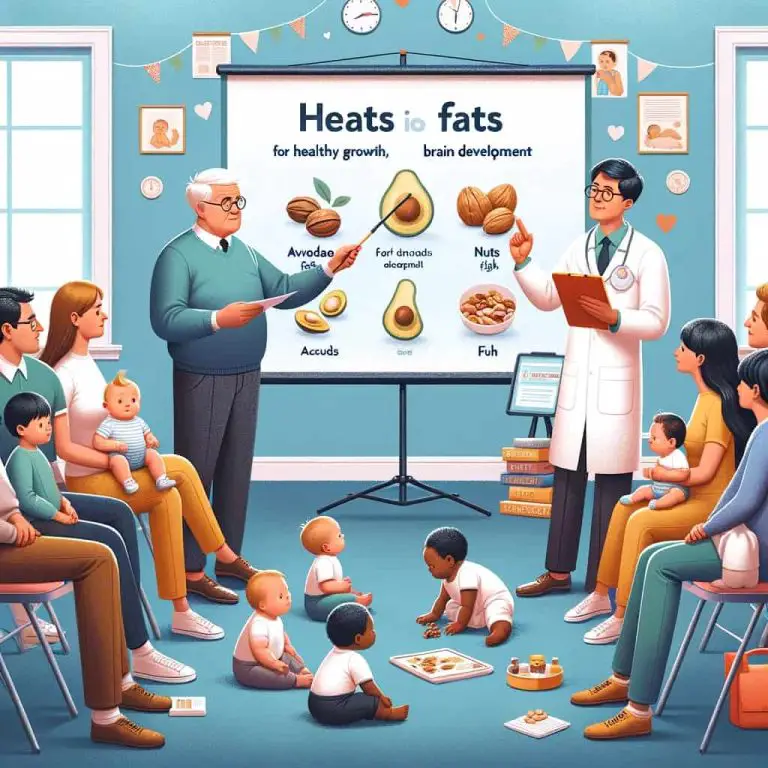Why Do Babies Need Carbohydrates? Essential Growth Fuel
Babies need carbohydrates to fuel growth and provide energy for brain development. These macronutrients are vital for their overall health and metabolism.
When we think about what babies eat, carbohydrates are super important, kind of like fuel for a car. Carbohydrates are found in lots of foods like milk, cereals, fruits, and even some vegetables. They are like tiny energy packets that help babies play, grow, and learn new things every day. Just like how a car needs gas to go, babies need carbohydrates to have the energy to do things like crawl, walk, and play with their toys
Carbohydrates are not just one thing; they come in different types. Some give quick energy, and others take a bit longer but keep the energy going for a longer time. They are really important for babies because their bodies and brains are growing so fast. Carbohydrates help make sure their bodies have enough energy to grow strong and their brains have enough power to learn lots of new things. So, when we feed babies foods with carbohydrates, we are giving them what they need to be happy, healthy, and full of energy!
The Importance Of Carbohydrates For Baby Development
As your little one embarks on the journey of growth, carbohydrates play a vital role. They are more than just energy; they are foundational for overall well-being. Babies need them for several reasons, and here’s how they support your baby’s development.
Energy Source For Growth
Carbohydrates are the main fuel for your growing baby. They break down into glucose which provides energy. This energy helps babies to crawl, walk, and explore.
- Supports physical activity: Muscle movements need glucose.
- Essential for metabolism: Helps in breaking down fats and proteins.
Development Of Brain And Nervous System
The brain relies on glucose as its primary source of energy. Proper brain development during infancy is critical. A steady supply of carbohydrates supports this complex process.
| Function | Importance |
| Memory Formation | Glucose aids in creating and recalling memories. |
| Learning Skills | Supports language development and problem-solving. |
| Sensory Processing | Essential for interpreting sights, sounds, and touch. |
In summary, carbohydrates are crucial for your baby’s growth and brain development. Include healthy carbs in your baby’s diet to fuel their adventurous days and support their developing mind.
Carbohydrates In Breast Milk
Breast milk is not just food. It’s a complex blend of nutrients. Babies need these nutrients to grow. Carbohydrates are key. They give energy. They also help with brain development. This is crucial for babies.
Lactose is the Primary Carbohydrate
Lactose is the main carbohydrate in breast milk. It is a sugar. It is very important for infants. Lactose provides almost half of a baby’s energy needs. It also helps in absorbing calcium. This is vital for bone health.
Benefits Of Lactose For Baby
- Energy: Lactose is a major energy source.
- Digestive Health: It promotes healthy gut bacteria.
- Brain Development: Lactose aids brain growth.
- Immune System: Lactose supports the immune system.
Carbohydrates In Infant Formula
Understanding the nutritional needs of babies is crucial, especially when it comes to carbohydrates in infant formula. Carbohydrates are essential for fueling a young child’s rapid growth and development. Infants require these nutrients for energy, brain development, and to support their fast-growing bodies. Here’s a closer look at why carbohydrates are integral to infant formula.
Types Of Carbohydrates Used
The right balance of carbohydrates is key in infant nutrition. The most common types found in formula include:
- Lactose – mirrors breast milk and aids in calcium absorption.
- Corn syrup solids – an alternative when lactose isn’t suitable.
- Sucrose – sometimes included, but less common in formulas.
Formulas may vary in carbohydrate source based on dietary needs or intolerance issues.
Role Of Carbohydrates In Formula
Carbohydrates serve several vital roles in infant formula:
- They provide a major source of energy for daily activities.
- They support brain development in the crucial early stages of life.
- They aid in the absorption of nutrients, benefiting overall health.
Carbohydrates also help maintain a good balance of gut bacteria, crucial for a healthy digestive system.
How Much Carbohydrates Do Babies Need?
Curious parents often wonder, “How much carbohydrates do babies need?” It’s a vital question since every bite matters for your little one’s growth and development. Babies use carbs for energy, to fuel brain development, and to support their rapid physical growth. Let’s delve into the guidelines and factors that determine the right amount for your little bundle of joy.
Guidelines For Carbohydrate Intake
Guidelines ensure babies get enough energy without overindulgence. The American Academy of Pediatrics suggests infants might start on solids around 6 months. Here’s what to know:
- Starting solids: Introduce simple carbohydrates through fruits and veggies.
- Daily needs: For toddlers 1-3 years old, 130 grams of carbohydrates daily is ideal.
- Balance is key: Offer a mix of carbs, proteins, and fats for a well-rounded diet.
Factors Influencing Carbohydrate Needs
Several factors come into play when determining the right amount of carbohydrates for a baby:
| Factor | Impact on Carb Needs |
| Age: | Younger babies need fewer carbs as they mostly rely on milk. |
| Activity level: | More active babies may need more carbs for energy. |
| Growth spurts: | During growth spurts, carb needs may increase. |
| Health: | Special health conditions may require adjustments to carb intake. |
The Role Of Carbohydrates In Digestion
Babies grow fast and need the right fuel to help their bodies develop properly. Carbohydrates play a crucial role in digestion, especially for the little ones. These nutrients break down into glucose, which provides essential energy. Plus, carbs contain fiber, aiding in healthy digestion.
Conversion Of Carbohydrates Into Glucose
Carbohydrates are the body’s main energy source. When babies eat foods like cereals or fruits, their bodies convert these carbs into glucose. Glucose is like the body’s fuel, powering everything from brain function to playtime. Ensuring babies get enough carbs means they have the energy needed to learn and grow.
Importance Of Fiber
Fiber is a special type of carbohydrate that doesn’t break down into sugar. Instead, it passes through the body undigested, helping to keep the digestive system running smoothly. Here’s why fiber is key for babies:
- Supports digestive health: Fiber helps prevent constipation, making for happier tummy times.
- Regulates blood sugar: It slows down the absorption of sugars, keeping energy levels stable.
- Fullness: Fiber-rich foods keep babies feeling full, ensuring they get all the nutrients they need.
Carbohydrate-rich Foods For Babies
Little ones need carbohydrate-rich foods for energy and growth.
These foods fuel their play, learning, and overall development.
Introduction Of Solid Foods
Starting solid foods marks a milestone in a baby’s diet.
This transition begins typically around 6 months of age.
Carbohydrates become important as they support increased energy needs.
Healthy Sources Of Carbohydrates
Babies require nutritious carbohydrates.
These can be introduced through a variety of wholesome foods.
| Food | Carbohydrate Type |
| Pureed fruits (like apples, bananas) | Natural sugars, fiber |
| Cereals (rice, oatmeal) | Complex carbs, iron-fortified |
| Soft-cooked vegetables (sweet potatoes, carrots) | Complex carbs, fiber |
- Squash and pumpkin are also great picks.
- Whole-grain breads and pastas offer fiber and nutrients.
- Legumes such as lentils provide carbs and protein.
Potential Risks Of Too Many Carbohydrates
Understanding the balance in a baby’s diet is crucial, especially when it comes to carbohydrates. While carbohydrates are essential for energy, too much can lead to health risks. Parents must be aware of these potential risks to ensure their baby’s diet supports healthy growth and development.
Risk Of Obesity
Carbohydrates are a key source of energy, but excessive intake can result in more energy than the body needs. This energy turns into fat, increasing obesity risks. Babies need energy for growth, yet excess carbohydrates can lead to:
- Unhealthy weight gain
- Increased fat storage
- Higher risk for childhood obesity
Portion control and balanced meals with plenty of fruits, vegetables, and whole grains help maintain a healthy weight.
Impact On Dental Health
Sugary foods and drinks from carbohydrates can affect a baby’s dental health. Regular exposure to sugary substances can lead to:
- Teeth decay
- Cavities
- Gum disease
Ensure babies brush their teeth after meals and limit sugary snacks to protect their smiles.
Understanding Carbohydrates On Food Labels
Peeking at food labels becomes a new habit for parents. Especially when understanding how carbohydrates fuel their little one’s growth. Carbs are key to a baby’s energy. Yet, what’s hidden behind those labels can be baffling. Let’s make sense of them together.
Different Types Of Carbohydrates
Carbohydrates are not all equal. There are simple carbs, like sugars in fruit. Complex carbs, found in grains, are different. They release energy slowly. Both types are vital for babies. They support brain development and physical activity.
Reading Ingredient Lists
Ingredient lists are treasure maps. They reveal what’s truly in food. Spot carbs easily. They end in ‘-ose‘ or are types of syrups. Remember, ingredients are listed by quantity. What you see first, there’s more of it in there. Choose products with whole foods at the top. This means better, longer-lasting energy for your baby.
A quick look at nutrition labels and ingredient lists helps you decide what’s best for your baby. Recognize these essentials:
- Total Carbohydrates – This number includes all types of carbs.
- Dietary Fiber – It’s a carb too, but it doesn’t break down. Fiber helps digestion.
- Sugars – Keep an eye on these. Natural sugars from fruits differ from added sugars.
Selecting the right carbs for your baby helps them thrive. Decipher food labels. Give them the best start!
Frequently Asked Questions On Why Do Babies Need Carbohydrates?
Why Are Carbohydrates Important For Infants?
Carbohydrates provide essential energy for infants to fuel growth, brain development, and physical activity. They are a crucial component of a balanced infant diet.
Why Are Carbohydrates Important For Kids?
Carbohydrates are crucial for kids as they supply essential energy for growth, brain function, and physical activity. They also help in maintaining healthy digestion with their fiber content.
What Happens If A Baby Doesn’t Get Enough Carbohydrates?
Babies not getting enough carbohydrates may experience energy deficits, impacting growth and development. Potential issues include weight loss, fatigue, and nutritional deficiencies.
Why Do Babies Love Carbs?
Babies often prefer carbs due to their easy digestion and quick energy provision. Carbohydrates also typically offer a sweet flavor, which is naturally appealing to young children’s taste preferences.
Conclusion
Carbohydrates play a pivotal role in infants’ growth and development. As key energy sources, they fuel physical activities and cognitive functions. Parents must ensure their baby’s diet includes the right amount of carbs. By doing so, they lay the groundwork for a healthy, active childhood and beyond.
Choose balanced nutrition for your little one’s best start in life.







